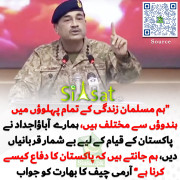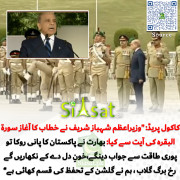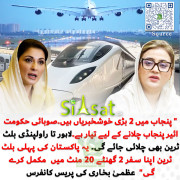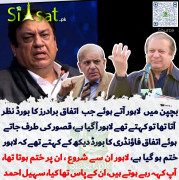عؔلی خان
MPA (400+ posts)
Quranism and Mainstream Islam: A Comparative Doctrinal and Methodological Analysis
In contrast, Quranists assert that the Quran is complete and self-explanatory, negating the need for supplementary texts. This approach challenges the traditional reliance on Hadith and raises questions about the adaptability and comprehensiveness of Islamic law without these sources.
Similarly, Patricia Crone (2004) indicates that the historical development of Islamic institutions and rituals cannot be fully comprehended without considering the Hadith. She argues that the Hadith serves as a vital link between the Quran and the lived experiences of the early Muslim community, facilitating a more nuanced understanding of Islamic teachings.
Wael Hallaq (2005) also points to the indispensable role of classical jurists in preserving the interpretive tradition. Harald Motzki (2002) has offered rigorous analysis of Hadith transmission, demonstrating its methodological robustness when compared to other historical traditions.
“The Qur'an-only movement... remains marginal and is often viewed with suspicion or hostility by mainstream Sunni and Shia communities.”
— John L. Esposito, The Oxford Dictionary of Islam (2003)
“Groups that deny the Sunnah have not managed to gain broad support and are generally considered heterodox within the Islamic world.”
— Wael B. Hallaq, Authority, Continuity, and Change in Islamic Law (2001)
This article has demonstrated that Quranism diverges substantially from mainstream Islamic thought, both in methodology and outcome. Drawing upon the works of non-Muslim scholars, the study illustrates the essential role that Hadith and Sunnah have historically played in the interpretation, implementation, and preservation of Islamic law and theology.
Future research may continue exploring the sociological and digital dynamics behind the spread of Quranist ideologies, but from a classical jurisprudential and theological standpoint, Quranism represents a significant departure from Islam as understood and practiced for over fourteen centuries.
Cook, M. (2000). The Koran: A very short introduction. Oxford University Press.
Crone, P. (2004). God's rule: Government and Islam. Columbia University Press.
Hallaq, W. B. (2005). The origins and evolution of Islamic law. Cambridge University Press.
Motzki, H. (2002). The origins of Islamic jurisprudence: Meccan fiqh before the classical schools. Brill Academic Publishers.
Schacht, J. (1950). The origins of Muhammadan jurisprudence. Oxford University Press.
Esposito, J. L. (2003). The Oxford dictionary of Islam. Oxford University Press.
Hallaq, W. B. (2001). Authority, continuity and change in Islamic law. Cambridge University Press.
---
Abstract: This article explores the distinctions between Quranist interpretations and mainstream Islamic thought, utilizing insights from non-Muslim scholars. By examining the historical development of Islamic jurisprudence and the role of Hadith literature, the study highlights the implications of Quranist approaches on the broader understanding of Islam.
Keywords: Quranism, Hadith, Islamic Jurisprudence, Sunnah, Tafsir, Non-Muslim Scholarship, Fiqh, Schacht, Crone, Cook, Motzki, Hallaq
Panthar_pk
observer-x
NasNY
Mocha7
Fact Checker
taban
Islamabadiya
saleema
Dr Adam
Kashif Rafiq
Adeel
jigrot
atensari
Introduction
Quranism, a movement within Islam, advocates for the Quran as the sole source of religious guidance, rejecting the Hadith and Sunnah. This perspective contrasts with mainstream Islamic thought, which considers the Hadith and Sunnah as essential for interpreting the Quran and implementing Islamic law. Non-Muslim scholars have analyzed these differing viewpoints, providing critical insights into their origins, methodologies, and impacts.Historical Roots of Quranism
Modern Quranist ideology can trace some of its roots to reformist thinkers like Ghulam Ahmed Parwez and later Rashad Khalifa, who advocated for a Quran-centric Islam and challenged the authority of classical Hadith literature. Their arguments gained traction in the 20th century amidst growing calls for modernist interpretations of religion. However, these figures introduced theological innovations that diverged significantly from classical Sunni and Shia traditions.Historical Context and Development
The mainstream Islamic tradition has historically emphasized the importance of Hadith literature in understanding the Quran. Joseph Schacht (1950), a prominent orientalist, argued that Islamic jurisprudence developed through the integration of Hadiths, which were instrumental in shaping legal and ethical norms within the Muslim community. Schacht's analysis underscores the centrality of Hadith in the formation of Islamic law and its application across diverse contexts.In contrast, Quranists assert that the Quran is complete and self-explanatory, negating the need for supplementary texts. This approach challenges the traditional reliance on Hadith and raises questions about the adaptability and comprehensiveness of Islamic law without these sources.
Academic Perspectives on Quranism
Non-Muslim scholars have critically examined the Quranist position, often highlighting its limitations. Michael Cook (2000), in his work The Koran: A Very Short Introduction, notes that the exclusion of Hadith literature can lead to a fragmented understanding of Islamic practices and beliefs. He emphasizes that the Hadith provides context and elaboration necessary for the practical implementation of Quranic principles.Similarly, Patricia Crone (2004) indicates that the historical development of Islamic institutions and rituals cannot be fully comprehended without considering the Hadith. She argues that the Hadith serves as a vital link between the Quran and the lived experiences of the early Muslim community, facilitating a more nuanced understanding of Islamic teachings.
Wael Hallaq (2005) also points to the indispensable role of classical jurists in preserving the interpretive tradition. Harald Motzki (2002) has offered rigorous analysis of Hadith transmission, demonstrating its methodological robustness when compared to other historical traditions.
Quranists and Demographic Reality: A Quantitative Perspective
While Quranist ideas have gained visibility through online platforms, their actual presence within the global Muslim community remains marginal. Scholars, demographers, and observers have repeatedly emphasized this discrepancy between perceived digital influence and real-world adherence.1. Lack of Census Recognition
Most national censuses do not document religious affiliation at the level of interpretive schools (e.g., Sunni, Shia, Quranist). As a result, there are no official demographic statistics available to quantify Quranist populations across the Muslim world.2. Scholarly Observations: A Marginal Minority
Academic literature consistently characterizes Quranists (also referred to as Quraniyoon or Hadith rejecters) as a fringe movement within the broader Islamic tradition:“The Qur'an-only movement... remains marginal and is often viewed with suspicion or hostility by mainstream Sunni and Shia communities.”
— John L. Esposito, The Oxford Dictionary of Islam (2003)
“Groups that deny the Sunnah have not managed to gain broad support and are generally considered heterodox within the Islamic world.”
— Wael B. Hallaq, Authority, Continuity, and Change in Islamic Law (2001)
3. Regional Patterns of Quranist Influence
- Pakistan: Quranist thought emerged in the 20th century through reformers like Ghulam Ahmed Parwez and the Tolu-e-Islam movement. While intellectually prominent in niche circles, Quranism has not found broad communal support. Estimated adherents are less than 0.1% of Pakistan’s Muslim population.
- Egypt and the Arab World: Figures such as Ahmed Subhy Mansour promoted Quranist theology before facing political exile. Quranist influence here remains limited and largely virtual.
- Western Contexts: In North America and Europe, some individuals promote Quranism via YouTube, blogs, or fringe publications. However, the movement lacks any institutional structure, seminary system, or communal recognition
4. Comparative Indicators
| Group | Estimated Global Share | Scholarly Consensus |
|---|---|---|
| Mainstream Muslims (Sunni + Shia) | ~99.99% of Muslims | Accept Hadith and Sunnah as integral sources of law and theology |
| Quranists | <0.01% | Largely considered heterodox or fringe; minimal institutional support |
5. Summary
Although digital platforms amplify Quranist messaging, their influence within Muslim-majority societies and scholarly institutions remains negligible. Theological critiques, rejection of the Sunnah, and refusal to engage with classical jurisprudence place Quranist ideology outside the interpretive framework that has defined Islam for over 1,400 years.Comparative Framework: Quranists vs. Mainstream Muslims
The following table presents 30 key doctrinal and methodological differences between Quranists and mainstream Muslims, offering one of the most detailed comparative references available for academic and interfaith engagement.| # | Topic | Quranists | Mainstream Muslims |
|---|---|---|---|
| 1 | Primary Source | Quran only | Quran + Sunnah + Hadith |
| 2 | Authority of Hadith | Rejected | Accepted with authentication |
| 3 | Definition of Sunnah | Often denied or reinterpreted | Prophetic model |
| 4 | Daily Prayers (Salat) | Disputed, symbolic, or redefined | 5 daily prayers as taught by the Prophet |
| 5 | Fasting (Sawm) | Metaphorical or loosely interpreted | Obligatory Ramadan fasting |
| 6 | Zakat | General charity only | Fixed rates and categories |
| 7 | Hajj | Rejected or reinterpreted | Classical pilgrimage rituals |
| 8 | Umrah | Absent or non-binding | Encouraged and practiced Sunnah |
| 9 | Qiblah | Optional or irrelevant | Face Kaaba in prayer per Quran (2:144) |
| 10 | Role of Prophet | Messenger only (postman model) | Messenger + explainer + role model |
| 11 | Ijmaʿ (Consensus) | Rejected | Accepted as source of law |
| 12 | Qiyas (Analogy) | Rejected | Accepted method of legal reasoning |
| 13 | Isnad (Hadith chains) | Irrelevant | Essential for verifying reports |
| 14 | Tafsir (Exegesis) | Self-interpretation only | Based on classical and linguistic scholarship |
| 15 | Language/Context | Literalist, dismisses historical context | Grammar, reasons of revelation, contextual reading |
| 16 | Juristic Schools | Rejected | Recognized schools (Hanafi, Shafi‘i, etc.) |
| 17 | Fiqh (Law) | Dismissed or minimal | Developed through juristic reasoning and ijmaʿ |
| 18 | Scholarly Authority | Rejected or mocked | Respected and preserved through isnād |
| 19 | Bidʿah (Innovation) | Often redefined | Rejected if it contradicts usul (principles) |
| 20 | Marriage Law | Vague or deconstructed | Based on Quran + Sunnah + fiqh |
| 21 | Inheritance Law | Simplified or reinterpreted | Based on Quran + detailed fiqh rulings |
| 22 | Hudud Punishments | Rejected | Based on Quran + Sunnah |
| 23 | Hijab | Often dismissed as cultural | Obligatory as per Quran (24:31, 33:59) |
| 24 | Taqleed (Following Scholars) | Condemned | Accepted with understanding |
| 25 | Companions (Sahabah) | Distrusted or dismissed | Honored and preserved legacy |
| 26 | Unity and Ummah | Individualistic | Collective identity central |
| 27 | Adhan (Call to Prayer) | Rarely practiced | Institutionalized |
| 28 | Eid Rituals | Reinterpreted | Based on Prophetic practice |
| 29 | Funeral Rites | Inconsistent | Structured per Hadith |
| 30 | View on Tradition | Reformist, ahistorical | Rooted in ijmaʿ, sanad, and Sunnah |
Glossary of Key Terms
- Qur'an
The central religious text of Islam, believed by Muslims to be the literal word of God (Allah), revealed to Prophet Muhammad (PBUH) over a period of 23 years. - Hadith
Narrations of the sayings, actions, approvals, and disapprovals of the Prophet Muhammad (PBUH). Hadith literature forms the second most authoritative source of Islamic law and guidance after the Qur’an. - Sunnah
The lived tradition and example of the Prophet Muhammad (PBUH), encompassing his practices, decisions, and moral conduct. The Sunnah is derived from authentic Hadith and considered essential for understanding the Qur’an. - Ijmaʿ (Consensus)
The consensus or unanimous agreement of qualified Islamic scholars on a point of Islamic law. Considered a source of legislation in mainstream Sunni jurisprudence. - Qiyas (Analogical Reasoning)
A method of deducing Islamic legal rulings for new issues by analogy with established rulings. It involves comparing a new case with an original case that has a clear ruling in the Qur'an or Sunnah. - Isnād
The chain of narrators through whom a hadith has been transmitted. The strength and authenticity of a hadith are largely determined by the reliability and continuity of its isnād. - Matn
The actual text or content of a hadith. Along with isnād, the matn is analyzed for consistency with established Islamic principles. - Tafsir
Qur’anic exegesis or interpretation. Classical tafsir involves linguistic, legal, historical, and theological analysis by qualified scholars (e.g., Al-Tabari, Ibn Kathir). - Fiqh
Islamic jurisprudence; the human understanding and application of Sharia (Islamic law), based on the Qur’an, Sunnah, ijmaʿ, and qiyas. Developed through the work of jurists and legal scholars. - Sharia
The moral and legal framework derived from divine sources in Islam, primarily the Qur’an and Sunnah, encompassing all aspects of a Muslim’s life. - Taqleed
The practice of following the legal opinions of a qualified scholar or juristic school without demanding proof for every ruling. Contrasted with ijtihad (independent reasoning). - Bidʿah (Innovation)
An innovation in religious matters. In Islamic law, it generally refers to introducing practices into religion that have no basis in the Qur’an or authentic Sunnah. - Madhhab
A recognized school of Islamic jurisprudence (e.g., Hanafi, Maliki, Shafi‘i, Hanbali) that interprets and applies Islamic law based on foundational texts. - Sahabah (Companions)
The companions of the Prophet Muhammad (PBUH) who directly learned from him and transmitted his teachings. They are considered reliable sources for understanding the Prophet’s practices. - Salat (Prayer)
The five daily ritual prayers prescribed in Islam. It includes specific physical postures and recitations, based on the practice of the Prophet Muhammad (PBUH). - Sawm (Fasting)
The act of abstaining from food, drink, and other physical needs from dawn to sunset during the month of Ramadan, as prescribed in the Qur’an and explained in Hadith. - Zakat
A mandatory form of almsgiving and one of the Five Pillars of Islam. It requires Muslims to give a fixed portion (typically 2.5%) of their wealth to those in need. - Hajj
The pilgrimage to Mecca, obligatory once in a lifetime for all Muslims who are physically and financially able. It includes specific rites established by the Prophet Muhammad (PBUH). - Umrah
The lesser pilgrimage to Mecca, which can be performed at any time of the year and includes rituals that are part of Hajj but in a shorter format. - Qiblah
The direction that Muslims face during prayer — towards the Kaaba in Mecca. Established in the Qur’an (2:144) and practiced universally by Muslims.
Conclusion
The examination of Quranism through the lens of non-Muslim scholarship reveals significant departures from mainstream Islamic thought. While the Quranist emphasis on the primacy of the Quran reflects a desire for purity in religious practice, the exclusion of Hadith literature overlooks the historical and practical dimensions that have shaped Islam's development.This article has demonstrated that Quranism diverges substantially from mainstream Islamic thought, both in methodology and outcome. Drawing upon the works of non-Muslim scholars, the study illustrates the essential role that Hadith and Sunnah have historically played in the interpretation, implementation, and preservation of Islamic law and theology.
Future research may continue exploring the sociological and digital dynamics behind the spread of Quranist ideologies, but from a classical jurisprudential and theological standpoint, Quranism represents a significant departure from Islam as understood and practiced for over fourteen centuries.
References:
Cook, M. (2000). The Koran: A very short introduction. Oxford University Press.
Crone, P. (2004). God's rule: Government and Islam. Columbia University Press.
Hallaq, W. B. (2005). The origins and evolution of Islamic law. Cambridge University Press.
Motzki, H. (2002). The origins of Islamic jurisprudence: Meccan fiqh before the classical schools. Brill Academic Publishers.
Schacht, J. (1950). The origins of Muhammadan jurisprudence. Oxford University Press.
Esposito, J. L. (2003). The Oxford dictionary of Islam. Oxford University Press.
Hallaq, W. B. (2001). Authority, continuity and change in Islamic law. Cambridge University Press.
---
Abstract: This article explores the distinctions between Quranist interpretations and mainstream Islamic thought, utilizing insights from non-Muslim scholars. By examining the historical development of Islamic jurisprudence and the role of Hadith literature, the study highlights the implications of Quranist approaches on the broader understanding of Islam.
Keywords: Quranism, Hadith, Islamic Jurisprudence, Sunnah, Tafsir, Non-Muslim Scholarship, Fiqh, Schacht, Crone, Cook, Motzki, Hallaq
Panthar_pk
observer-x
NasNY
Mocha7
Fact Checker
taban
Islamabadiya
saleema
Dr Adam
Kashif Rafiq
Adeel
jigrot
atensari
Last edited:


































